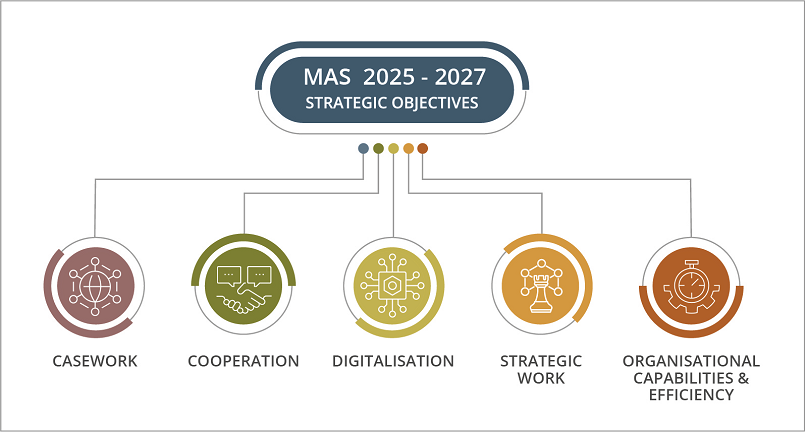Eurojust’s Multi-Annual Strategies (MAS) cover a three-year period and set out Eurojust’s mission statement, Multi-Annual Strategic Objectives (MASO) and Strategic Action Areas (SAA).
In the annual budget planning process, the MAS is translated into annual objectives, activities and performance indicators of the annual work programme of the Single Programming Document, upon which the corresponding financial and human resources comprising the budget are established.
The progress in achieving the Multi-Annual Strategic Objectives is monitored and reported on a quarterly basis through the strategic performance indicators.
Eurojust’s Multi-Annual Strategy 2025-2027 serves to guide the activities and priorities of the organisation, outlining the goals and objectives to further Eurojust’s vision as the EU’s hub for judicial cooperation. The challenges that lie ahead in the coming years will require the Agency to strengthen existing partnerships and build new alliances, bring judicial cooperation up to the digital standards of the 21st century and further streamline internal processes.

The current MAS sets out Eurojust’s main strategic objectives for 2025-2027. Each of these strategic objectives is divided into action areas and linked to Key Performance Indicators (KPIs).
The strategic objectives relate to
- Casework: Casework forms the core of Eurojust’s mandate. With every new case comes a new opportunity to hold criminals responsible for their actions and bring justice to their victims.
- Cooperation: Close cooperation with stakeholders from within the EU and beyond is a key component of Eurojust’s success.
- Digitalisation: Eurojust will actively contribute to the EU’s efforts to bring cross-border criminal justice cooperation up to state-of-the-art digital standards.
- Strategic work: Unique strategic insights and achievements strengthen Eurojust’s role as the EU’s centre of expertise in cross-border judicial cooperation.
- Organisational capabilities & efficiency: Eurojust is a highly professional organisation, built on the principles of efficiency, strong organisational management and internal control, and reduced environmental impact.
